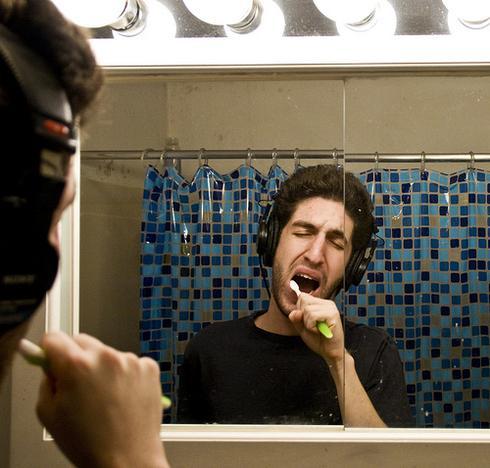Advertisement
From MIT: Why You Shower, Then Brush (Or Vice Versa)

This week, when you woke up, you checked your e-mail, brushed your teeth, ate some oatmeal, and then took a shower. Maybe last week, when you woke up, you showered, brushed your teeth, ate, and then checked your e-mail.
A new Massachusetts Institute of Technology study suggests that your routines and habits may be changing constantly until your brain finds the most efficient way to finish a task or set of tasks, even if you don’t notice the minor alterations.
The new study by MIT professor and neuroscientist Ann Graybiel and graduate student Theresa Desrochers suggests that your routines and habits may be a way your brain seeks a reward that isn’t immediately obvious to other people, or even to you. The reward in this example, and in the study, is saving time.
The study, published in the Proceedings of the National Academy of Sciences, required two untrained monkeys to scan dots with their eyes in exchange for food rewards.
The researchers found that the monkeys used trial-and-error to find more efficient ways to connect the dots, even though the scientists gave them the same rewards each time, regardless of how quickly they finished the tests.
Graybiel and Desrochers hypothesize that the monkeys’ behavior was an automatic response to rewards and costs. The monkeys’ brains saw spending a few extra seconds on the tests as a cost, and finishing the test more efficiently as a reward.
At first, Graybiel and Desrochers did not understand why the monkeys were constantly changing their eye movements, because the time it saved them was negligible and their efficiency did not always increase in subsequent tests.
“The increments of improvement in lowering costs were so tiny that they were almost unobservable,” Graybiel says.
But the trial-and-error ultimately paid off. In the last trial, one monkey finished the test in the most efficient way possible, and the other came very close.
Graybiel says your routines and habits may also be automatic and driven by rewards and costs.
“A lot of habits don’t seem like they’re reward-driven at all…they just seem like you’ve got this thing you do,” Graybiel says. “What we’re wondering is whether, underneath all of that…maybe the brain is chugging along, trying hard to do its thing optimally.”
For instance, Desrochers says, you may be doing this automatically on your way to work every day: You take one route for a while, and then one day you change courses –- go down a different street, or turn at a new intersection. You generally don’t make these small changes consciously, Derochers says, but they could be your brain’s way of finding the most efficient routes to your job.
“The tiny differences in the time it takes to get to work are influencing you, even if you don’t realize it,” Derochers says.
Graybiel says it’s not clear that habits and routines are always useful, but people all over the world have them, and there may be something more than incidental about them.
“It’s just amazing that people in all different cultures do these things. There must be little behavioral patterns that are natural to people, or are natural to birds or other animals. Those can become emphasized to the point of being abnormally frequent in their occurrence,” she says.
Graybiel says the brain’s automatic search for what seem like negligible rewards may be able to explain disorders such as Tourettes Syndrome or Obsessive Compulsive Disorder.
“It would be our dream to try to find the brain mechanisms underlying these sorts of behaviors so that then that knowledge could be translated into something that would help people,” she says.
This program aired on October 27, 2010. The audio for this program is not available.
